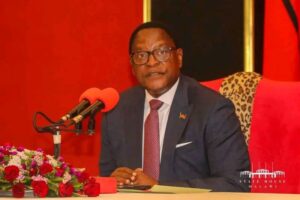By Burnett Munthali
Political analysts are urging Malawian political parties to consider forming alliances well before the September 2025 elections, cautioning that waiting for a possible election rerun could be risky. With the political landscape becoming increasingly competitive, experts suggest that early alliances could strengthen parties’ chances of securing victory in the first round, rather than relying on post-election partnerships to sway a rerun.
Malawi’s recent election history has demonstrated the potential pitfalls of fragmented political participation. The 2019 presidential election, which was nullified due to irregularities, saw a highly divided vote among the main political parties, forcing a rerun in 2020. The subsequent rerun led to the formation of a coalition between the Malawi Congress Party (MCP) and the United Transformation Movement (UTM), which eventually brought President Lazarus Chakwera into power. However, analysts argue that relying on a rerun could be dangerous, as electoral dynamics often shift unpredictably.

According to political commentator Henry Mhlanga, “Waiting until after the first round of elections to form alliances might backfire. In a highly competitive environment, parties risk being left out in the cold if they fail to prepare early. The time to consolidate political support is now, not after the election.”
One of the main risks in waiting for a rerun is that the political momentum can quickly change between rounds, particularly if there is a low voter turnout or shifts in public opinion between the two phases. As Lindiwe Phiri, a lecturer in political science, points out, “If a party does poorly in the first round, it may lose bargaining power to negotiate strong post-election alliances. The unpredictability of rerun outcomes also makes it difficult to rely on that strategy.”
Phiri notes that, in recent years, alliances have become a critical component of winning elections in Malawi. “If political parties want to ensure that they can gain or maintain power, they need to secure their alliances ahead of time. This prevents scrambling for partnerships under pressure after the first round,” she says.
Early alliances can also help parties consolidate their voter base, ensuring they appeal to a broader section of the electorate. By forming coalitions now, parties can present a unified front, with a shared platform and candidate, which could strengthen their chances of winning in the first round and avoid the cost and uncertainty of a rerun.
“An alliance between like-minded parties can increase voter confidence and reduce the risk of votes being split between multiple candidates,” argues Charles Nkhata, a political strategist. “It’s better to enter the election united and strong than to hope for an alliance after the fact.”
Political parties in Malawi are already positioning themselves ahead of the 2025 elections. The ruling MCP is seeking to consolidate its position after facing criticism over unmet campaign promises, while opposition parties like the Democratic Progressive Party (DPP) and UTM are looking for strategies to regain or maintain influence.
Mhlanga observes that the DPP, which has experienced internal conflicts and defections, may find itself particularly vulnerable if it does not secure alliances early. “The DPP is going through a challenging phase, and it cannot afford to wait until after the first round of elections to think about forming coalitions. Its best chance of reclaiming power is through a well-planned alliance that boosts its support base from the start.”
For smaller parties, early alliances may be crucial to their political survival. In an increasingly polarized political environment, smaller parties often struggle to gain traction on their own. Experts warn that without forming alliances ahead of time, these parties risk being irrelevant by the time a rerun occurs.
“Smaller parties should not overestimate their ability to influence a rerun,” says Phiri. “Many assume they will play the kingmaker role if no candidate wins outright in the first round, but that’s a dangerous gamble. It’s better to enter into alliances now and ensure they have a seat at the table in any future government.”
*Conclusion*
With the September 2025 elections fast approaching, political experts are advising Malawian parties to form alliances sooner rather than later. The risks of waiting for a potential rerun are significant, and the current political climate demands early strategic partnerships. By solidifying alliances well in advance, parties can maximize their chances of electoral success and ensure they remain relevant in the shifting political landscape of Malawi.



